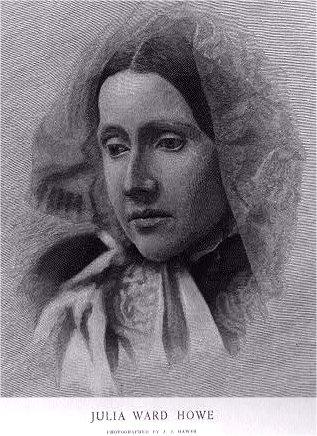
Music is important to us. We use it to set the mood, lift our spirits, and teach, among other reasons. If we were to look at the most popular songs of America today, we’d get a sense of what is important to our culture, wouldn’t we? When writing historical fiction, we can do the same thing. Looking at the popular songs and poetry gives me a more robust flavor of the Civil War era, and helps me understand the mindsets of my characters better. Music was so much a part of life then (just as it is today) that some of the lyrics made their way into my novel, Wedded to War, and they will appear in the rest of the series as well. Here are five songs and poems which both reflected and colored public and military sentiment.
Victory’s Band by Dan Emmett
This song, written in 1861, was sung to the tune of Dixie’s Land. In my novel, troops stationed outside Washington City sang this song after a day of drilling before they were tested with their first real battle—the Battle of Bull Run.
We’re marching under the Flag of union,
Keeping step in brave communion!
March away! March away! Away! Victory’s band!
Right down upon the ranks of rebels,
Tramp them underfoot like pebbles,
March away! March away! Away! Victory’s band!
CHORUS Oh! We’re marching on to Victory! Hurrah! Hurrah!
In Victory’s band we’ll sweep the land, And fight or die for Victory! Away! Away! We’ll fight or die for victory!
This song reflected their over-confidence. The Union suffered a staggering defeat at the Battle of Bull Run and retreated in shame.
Battle Hymn of the Republic by Julia Ward Howe
Julie Ward Howe was prompted to rewrite the lyrics to the tune of John Brown’s Body (aka the John Brown Songs) when she was staying at the Willard Hotel in Washington City in November 1861. She awoke before dawn, penned the new lyrics, and went back to bed. It was first published in the Atlantic Monthly in 1862 and soon became the rallying cry of the Union.
Mine eyes have seen the glory of the coming of the Lord;
He is trampling out the vintage where the grapes of wrath are stored;
He hath loosed the fateful lightning of His terrible swift sword;
His truth is marching on.
Glory! Glory! Hallelujah!
Glory! Glory! Hallelujah!
Glory! Glory! Hallelujah!
His truth is marching on.
I have seen Him in the watch fires of a hundred circling camps
They have builded Him an altar in the evening dews and damps;
I can read His righteous sentence by the dim and flaring lamps;
His day is marching on.
Glory! Glory! Hallelujah!
Glory! Glory! Hallelujah!
Glory! Glory! Hallelujah!
His truth is marching on.
I have read a fiery Gospel writ in burnished rows of steel;
“As ye deal with My contemners, so with you My grace shall deal”;
Let the Hero, born of woman, crush the serpent with His heel,
Since God is marching on.
Glory! Glory! Hallelujah!
Glory! Glory! Hallelujah!
Glory! Glory! Hallelujah!
Since God is marching on.
He has sounded forth the trumpet that shall never call retreat;
He is sifting out the hearts of men before His judgment seat;
Oh, be swift, my soul, to answer Him! be jubilant, my feet;
Our God is marching on.
Glory! Glory! Hallelujah!
Glory! Glory! Hallelujah!
Glory! Glory! Hallelujah!
Our God is marching on.
In the beauty of the lilies Christ was born across the sea,
With a glory in His bosom that transfigures you and me:
As He died to make men holy, let us live to make men free; [originally …let us die to make men free]
While God is marching on.
Glory! Glory! Hallelujah!
Glory! Glory! Hallelujah!
Glory! Glory! Hallelujah!
While God is marching on.
He is coming like the glory of the morning on the wave,
He is wisdom to the mighty, He is honor to the brave;
So the world shall be His footstool,and the soul of wrong His slave,
Our God is marching on.
Glory! Glory! Hallelujah!
Glory! Glory! Hallelujah!
Glory! Glory! Hallelujah!
Our God is marching on.
Singing songs like this at a battlefield hospital increased morale—and helped drown out the moaning of wounded and dying men.
When the soaking, sodden ground
Will not echo to the footfall
Of the sentinel’s dull round.
To-night is not unfurled;
Surely He has not deserted
This weary, warring world.
And the crowding fancies come:
The night wind, blowing northward,
Carries all my heart toward home.
Not exactly to my mind;
But my country called for helpers,
And I couldn’t stay behind.
And have roughed it many ways,
And death has nearly had me;-
Yet I think the service pays.
Whether you live or die—
You helped your country in her need,
And fought right loyally.
When a wet day’s leisure comes,
And I hear the old home voices
Talking louder than the drums,
Peep in at my tent door,
And the little children’s footsteps
Go pit-pat on the floor,—
Of all the parson reads
About that other soldier-life
Which every true man leads.
Seems a-saying in my ear,
“I’d rather have you in those ranks
Than to see you brigadier.”
Published in 1863, “When This Cruel War is Over” (also known as “Weeping, Sad and Lonely”) was one of the best-selling songs during the war both in the North and the South, with more than a million copies of the sheet music sold.
Dearest Love, do you remember, when we last did meet,
How you told me that you loved me, kneeling at my feet?
Oh! How proud you stood before me, in your suit of blue,
When you vow’d to me and country, ever to be true.
CHORUS: Weeping, sad and lonely, hopes and fears how vain!
When this cruel war is over, praying that we meet again.
When the summer breeze is sighing, mournfully along,
Or when autumn leaves are falling, sadly breathes the song.
Oft in dreams I see thee lying on the battle plain,
Lonely, wounded, even dying, calling but in vain.
CHORUS: Weeping, sad and lonely, hopes and fears how vain!
When this cruel war is over, praying that we meet again.
If amid the din of battle, nobly you should fall,
Far away from those who love you, none to hear you call –
Who would whisper words of comfort, who would soothe your pain?
Ah! The many cruel fancies, ever in my brain.
CHORUS: Weeping, sad and lonely, hopes and fears how vain!
When this cruel war is over, praying that we meet again.
But our Country called you, Darling, angels cheer your way;
While our nation’s sons are fighting, we can only pray.
Nobly strike for God and Liberty, let all nations see
How we loved the starry banner, emblem of the free.
CHORUS: Weeping, sad and lonely, hopes and fears how vain!
When this cruel war is over, praying that we meet again.
How interesting to see how the sentiments changed from the first two songs on this list to the last two. The war clearly lost its glory and glamour as both Union and Confederacy grew weary of the fight. Think again about the music we listen to today. What does it say about us? What does your music say about you, or about how you view life?

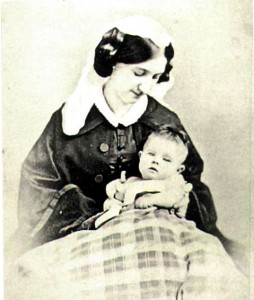
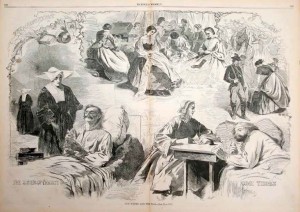
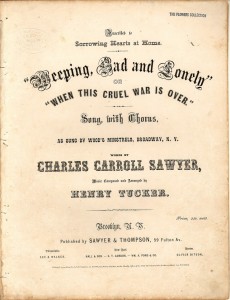
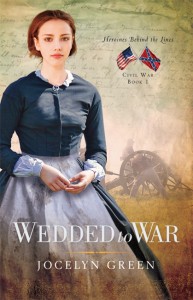

Add new comment